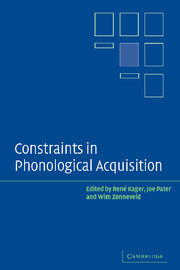Book contents
- Frontmatter
- Contents
- List of contributors
- Abbreviations
- Preface
- 1 Introduction: constraints in phonological acquisition
- 2 Saving the baby: making sure that old data survive new theories
- 3 Markedness and faithfulness constraints in child phonology
- 4 Input elaboration, head faithfulness, and evidence for representation in the acquisition of left-edge clusters in West Germanic
- 5 Phonological acquisition in Optimality Theory: the early stages
- 6 Syllable types in cross-linguistic and developmental grammars
- 7 Bridging the gap between receptive and productive development with minimally violable constraints
- 8 Learning phonotactic distributions
- 9 Emergence of Universal Grammar in foreign word adaptations
- 10 The initial and final states: theoretical implications and experimental explorations of Richness of the Base
- 11 Child word stress competence: an experimental approach
- Index of subjects
- Index of names
9 - Emergence of Universal Grammar in foreign word adaptations
Published online by Cambridge University Press: 22 September 2009
- Frontmatter
- Contents
- List of contributors
- Abbreviations
- Preface
- 1 Introduction: constraints in phonological acquisition
- 2 Saving the baby: making sure that old data survive new theories
- 3 Markedness and faithfulness constraints in child phonology
- 4 Input elaboration, head faithfulness, and evidence for representation in the acquisition of left-edge clusters in West Germanic
- 5 Phonological acquisition in Optimality Theory: the early stages
- 6 Syllable types in cross-linguistic and developmental grammars
- 7 Bridging the gap between receptive and productive development with minimally violable constraints
- 8 Learning phonotactic distributions
- 9 Emergence of Universal Grammar in foreign word adaptations
- 10 The initial and final states: theoretical implications and experimental explorations of Richness of the Base
- 11 Child word stress competence: an experimental approach
- Index of subjects
- Index of names
Summary
Introduction
There has been a renewal of interest in the study of loanword phonology since the recent development of constraint-based theories. Such theories readily express target structures and modifications that foreign inputs are subject to (e.g., Paradis and Lebel 1994, Itô and Mester 1995a,b). Depending on how the foreign sounds are modified, we may be able to make inferences about aspects of the speaker's grammar for which the study of the native vocabulary is either inconclusive or uninformative. At the very least we expect foreign words to be modified in accordance with productive phonological processes and constraints (Silverman 1992, Paradis and Lebel 1994). It therefore comes as some surprise when patterns of systematic modification arise for which the rules and constraints of the native system have nothing to say or even worse contradict. I report a number of such ‘emergent’ patterns that appear in our study of the adaptations of French words by speakers of Japanese (Shinohara 1997a,b, 2000). I claim that they pose a learnability problem. My working hypothesis is that these emergent patterns are reflections of Universal Grammar (UG). This is suggested by the fact that the emergent patterns typically correspond to well-established cross-linguistic markedness preferences that are overtly and robustly attested in the synchronic phonologies of numerous other languages. It is therefore natural to suppose that these emergent patterns follow from the default parameter settings or constraint rankings inherited from the initial stages of language acquisition that remain latent in the mature grammar.
- Type
- Chapter
- Information
- Constraints in Phonological Acquisition , pp. 292 - 320Publisher: Cambridge University PressPrint publication year: 2004
- 6
- Cited by



